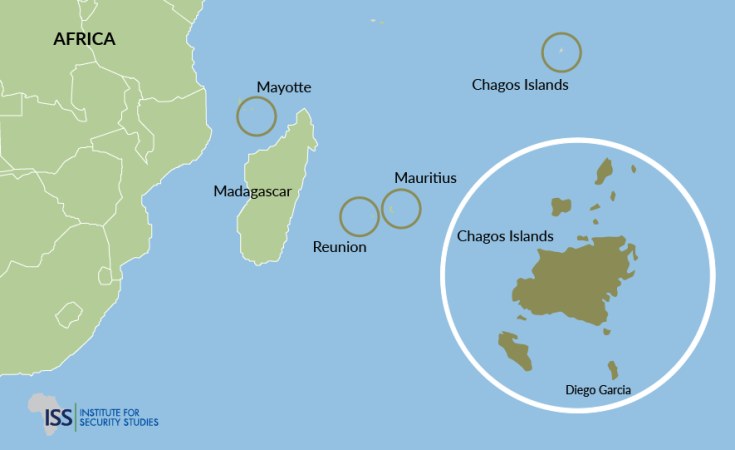The bitter wrangle with the UK has come to an end, but the devil will be in the treaty's details.
Mauritius and the United Kingdom (UK) have reached an agreement on the Chagos Islands - the beginning of the end of a decades-long tussle between them.
In a joint statement on 3 October, both countries announced that the Chagos Archipelago would be recognised as part of Mauritius - with one condition: the UK and United States (US) maintain their military presence on the largest island, Diego Garcia.
Mauritius and the UK must now agree on a treaty and supporting legal instruments to give effect to the political decision.
The story of the Chagos Islands' status spans centuries. During France's colonisation of Mauritius and other Western Indian Ocean islands in the 1700s and 1800s, they were administered as a Mauritian dependency. This continued after 1814, when Britain took control of the islands.
In 1965, as part of the decolonisation process, the UK separated the islands from Mauritius, creating a new colony. From 1968 (when Mauritius gained independence), the UK expelled Chagossians from the islands to pave the way for a US military base it agreed on in 1966.
Mauritius has tried, since 1968, to regain the Chagossian territory peacefully. When negotiations with the UK failed, it approached the Permanent Court of Arbitration in 2010. The court agreed with Mauritius, but the UK persisted. In 2019, the International Court of Justice (ICJ) ruled that the UK's occupation was unlawful. And yet the islands remained British territory.
Based on the ICJ advisory opinion, Mauritius took the Maldives - with whom it shares a border - to the International Tribunal for the Law of the Sea to confirm Mauritius' maritime borders. In doing so, the tribunal ruled that the UK's administration over the Chagos Islands was unlawful and that they were Mauritian territory. This, too, failed to resolve the issue.
Finally, armed with three UN court findings and support from the United Nations General Assembly, the African Union, some African countries and India, negotiations started in 2022 and led to the current settlement.
While details still need ironing out, both countries see the agreement as a win. 'This is a seminal moment in our relationship and a demonstration of our enduring commitment to the peaceful resolution of disputes and the rule of law,' said UK Prime Minister Keir Starmer and Mauritius Prime Minister Pravind Jugnauth in their joint statement.
But what's really in it for the two countries?
For the UK, it ensures continued strategic presence through its joint military base with the US. UK Foreign Secretary David Lammy said it would also 'shut down any possibility of the Indian Ocean being used as a dangerous illegal migration route to the UK.' In recent years, a few migrants have arrived on the Chagos Islands, with some seeking asylum in the UK. Once they become Mauritian territory, Mauritius will be responsible for future arrivals.
For Mauritius, the deal marks a historic reclamation of territory and a measure of justice. The government has long argued that the UK illegally forced it to give away the Chagos Islands in return for its own independence.
While about 280 Chagossians received some compensation from the UK in the 1970s following their expulsion from the islands, this was seen as insufficient. As part of the proposed treaty, Mauritius seeks provisions to 'address wrongs of the past and demonstrate the commitment of both parties to support [Chagossians'] welfare.'
To this end, the UK will provide a financial support package to Mauritius, including annual payments and infrastructure investment. This aligns with a 2023 Human Rights Watch report calling on the UK to pay full, unconditional reparations to generations affected by its forcible displacement. This had been 'an appalling colonial crime' and a crime against humanity by the UK and US, it said.
Finally, Mauritius can start resettling the Chagos Islands. For Chagossians, this will be significant. Long before Mauritius' claim gained momentum internationally, Chagossians in both Mauritius and the UK repeatedly took the British government to court regarding their expulsion and the UK's continued occupation.
But not everyone is happy with this deal. Chagossian Voices (a UK-based grassroots platform) deplored the exclusion of Chagossians from the negotiations. In a statement on 3 October, the group demanded they be involved in drafting the treaty.
The agreement on Diego Garcia and the continued presence of the UK-US base is particularly controversial. Most Chagossians were expelled from that island, and the deal scuppers the possibility of them and their descendants resettling there.
Some Chagossians maintain that the fight for the Chagos Islands isn't over. For them, Chagossians have a right to self-determination and full independence. They want neither the UK nor Mauritius to claim ownership of the islands.
This spotlights another dimension to this development: while most colonialism ended decades ago, not all territories were relinquished. Having let go of most of its vast global empire by 1980, the UK still maintains 17 island territories and jurisdiction over two sovereign base areas on Cyprus.
France, similarly, has 16 overseas territories, including Mayotte, Reunion, Tromelin Island, and small islands in the Indian Ocean neighbouring Africa. The US has 14. Other countries maintaining overseas territories include Australia, the Netherlands, New Zealand, Norway, Denmark, Spain, and China. Could the resolution of the Chagos Islands issue set a precedent for other similar territories?
Over the coming months, negotiators and legal drafters for Mauritius and the UK will hunker down to finalise the treaty's text. While this process is unlikely to encounter much resistance, time will tell whether it will be a Faustian pact or a freedom charter.
Ottilia Anna Maunganidze, Head of Special Projects, ISS


